Boardman J., Hammond N.G. L. The Cambridge Ancient History Volume 3, Part 3: The Expansion of the Greek World, Eighth to Sixth Centuries BC
Подождите немного. Документ загружается.

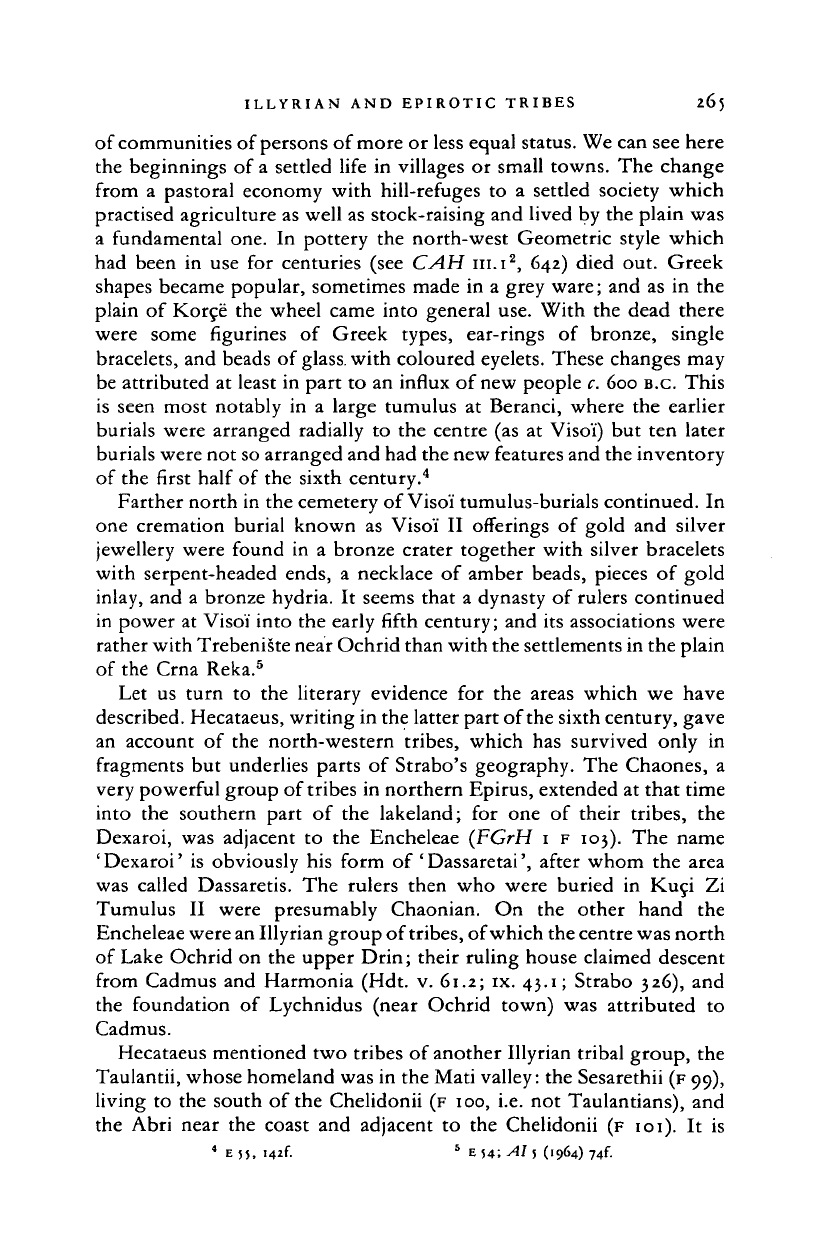
ILLYRIAN AND EPIROTIC TRIBES 265
of communities of persons of more or less equal status. We can see here
the beginnings of a settled life in villages or small towns. The change
from
a
pastoral economy with hill-refuges
to a
settled society which
practised agriculture as well as stock-raising and lived by the plain was
a fundamental one.
In
pottery the north-west Geometric style which
had been
in
use
for
centuries (see
CAH
in. i
2
, 642) died out. Greek
shapes became popular, sometimes made in a grey ware; and as in the
plain
of
Korce the wheel came into general use. With the dead there
were some figurines
of
Greek types, ear-rings
of
bronze, single
bracelets, and beads of
glass,
with coloured eyelets. These changes may
be attributed at least in part to an influx of new people
c.
600 B.C. This
is seen most notably
in a
large tumulus
at
Beranci, where the earlier
burials were arranged radially
to
the centre (as
at
Visoi) but ten later
burials were not so arranged and had the new features and the inventory
of the first half of the sixth century.
4
Farther north in the cemetery of Visoi tumulus-burials continued.
In
one cremation burial known
as
Visoi
II
offerings
of
gold and silver
jewellery were found
in a
bronze crater together with silver bracelets
with serpent-headed ends,
a
necklace
of
amber beads, pieces
of
gold
inlay, and
a
bronze hydria.
It
seems that
a
dynasty of rulers continued
in power at Visoi into the early fifth century; and its associations were
rather with Trebeniste near Ochrid than with the settlements in the plain
of the Crna Reka.
5
Let
us
turn
to
the literary evidence
for
the areas which we have
described. Hecataeus, writing in the latter part of the sixth century, gave
an account
of
the north-western tribes, which has survived only
in
fragments but underlies parts
of
Strabo's geography. The Chaones,
a
very powerful group of tribes in northern Epirus, extended at that time
into
the
southern part
of
the lakeland;
for
one
of
their tribes,
the
Dexaroi, was adjacent
to
the Encheleae (FGrH 1
F
103). The name
'Dexaroi'
is
obviously his form
of
'Dassaretai', after whom the area
was called Dassaretis. The rulers then who were buried
in
Kuci
Zi
Tumulus
II
were presumably Chaonian.
On the
other hand
the
Encheleae were an Ulyrian group of
tribes,
of which the centre was north
of Lake Ochrid on the upper Drin; their ruling house claimed descent
from Cadmus and Harmonia (Hdt. v. 61.2; ix. 43.1; Strabo 326), and
the foundation
of
Lychnidus (near Ochrid town) was attributed
to
Cadmus.
Hecataeus mentioned two tribes of another Ulyrian tribal group, the
Taulantii, whose homeland was in the Mati valley: the Sesarethii
(F
99),
living to the south of the Chelidonii (F 100, i.e. not Taulantians), and
the Abri near the coast and adjacent
to
the Chelidonii (F
IOI).
It is
4
E )
5
,
I
4
2f.
5
E 54;
Al
5
(1964)
74
f.
Cambridge Histories Online © Cambridge University Press, 2008
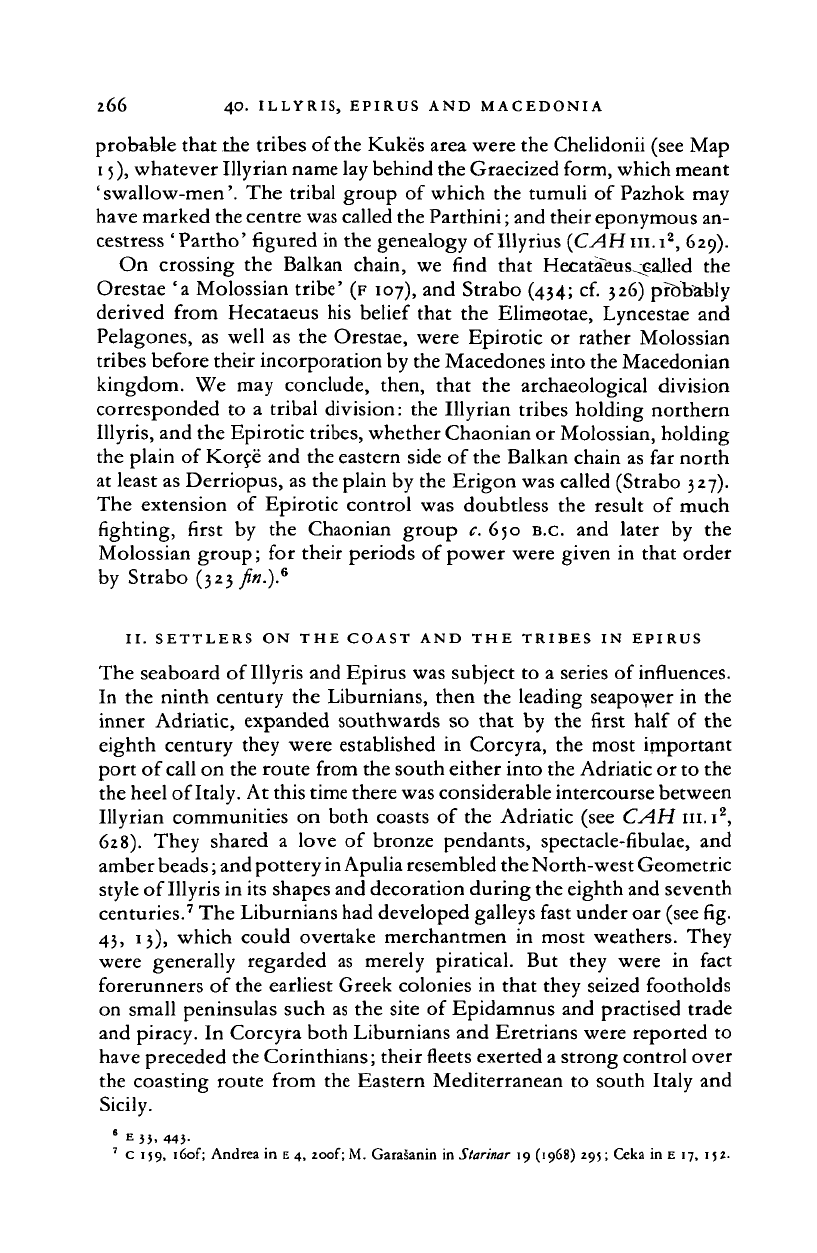
266 4°- ILLYRIS, EPIRUS AND MACEDONIA
probable that
the
tribes of the Kukes area were
the
Chelidonii
(see Map
15),
whatever Illyrian name lay behind the Graecized form, which meant
'swallow-men'.
The
tribal group
of
which
the
tumuli
of
Pazhok
may
have marked the centre was called the Parthini; and their eponymous
an-
cestress 'Partho' figured
in the
genealogy
of
Illyrius
(CAH in. i
2
,
629).
On crossing
the
Balkan chain,
we
find that Hecataeus^alled
the
Orestae
'a
Molossian tribe' (F 107),
and
Strabo (434;
cf.
326) probably
derived from Hecataeus
his
belief that
the
Elimeotae, Lyncestae
and
Pelagones,
as
well
as
the
Orestae, were Epirotic
or
rather Molossian
tribes before their incorporation
by
the Macedones into the Macedonian
kingdom.
We
may
conclude, then, that
the
archaeological division
corresponded
to a
tribal division:
the
Illyrian tribes holding northern
Illyris,
and the
Epirotic tribes, whether Chaonian
or
Molossian, holding
the plain
of
Korce
and the
eastern side
of
the Balkan chain
as far
north
at least as Derriopus,
as
the plain
by the
Erigon was called (Strabo
327).
The extension
of
Epirotic control
was
doubtless
the
result
of
much
fighting, first by
the
Chaonian group c.
650
B.C.
and
later
by the
Molossian group;
for
their periods
of
power were given
in
that order
by Strabo
(323
fin.).
6
II.
SETTLERS ON THE COAST AND THE TRIBES IN EPIRUS
The seaboard
of
Illyris
and
Epirus
was
subject
to a
series
of
influences.
In
the
ninth century
the
Liburnians, then
the
leading seapower
in the
inner Adriatic, expanded southwards
so
that
by
the
first half
of
the
eighth century they were established
in
Corcyra,
the
most important
port
of
call
on the
route from
the
south either into
the
Adriatic
or to the
the heel of Italy.
At
this time there was considerable intercourse between
Illyrian communities
on
both coasts
of
the
Adriatic
(see
CAH
in.
i
2
,
628).
They shared
a
love
of
bronze pendants, spectacle-fibulae,
and
amber
beads;
and pottery
in
Apulia resembled the North-west Geometric
style of Illyris
in its
shapes and decoration during the eighth and seventh
centuries.
7
The
Liburnians had developed galleys fast under
oar
(see
fig.
43,
J
3)>
which could overtake merchantmen
in
most weathers. They
were generally regarded
as
merely piratical.
But
they were
in
fact
forerunners
of
the earliest Greek colonies
in
that they seized footholds
on small peninsulas such
as the
site
of
Epidamnus
and
practised trade
and piracy.
In
Corcyra both Liburnians
and
Eretrians were reported
to
have preceded
the
Corinthians; their fleets exerted
a
strong control over
the coasting route from
the
Eastern Mediterranean
to
south Italy
and
Sicily.
6
E
33,
443.
7
c
159, i6of;
Andrea
in
E
4, 2oof;
M. Garasanin
in
Starinar
19
(1968)
295;
Ccka
in E 17, 152.
Cambridge Histories Online © Cambridge University Press, 2008
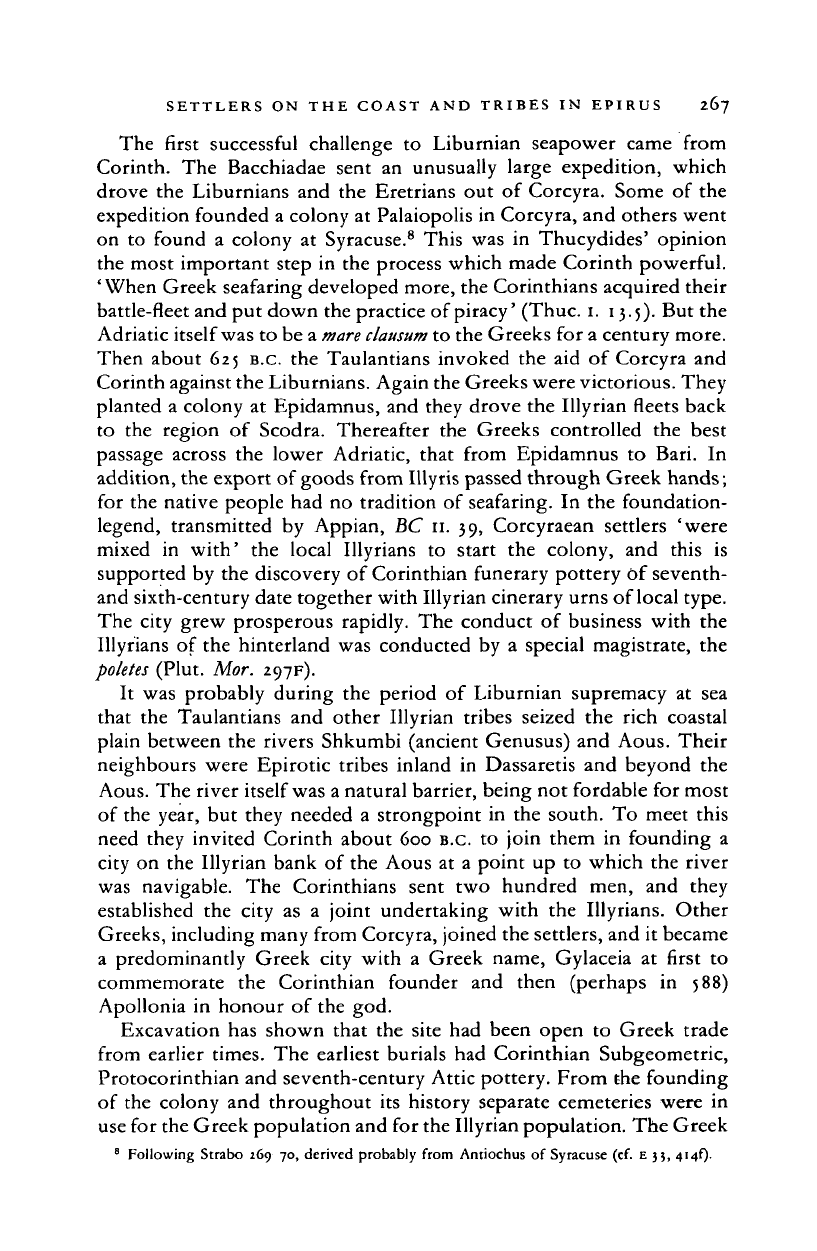
SETTLERS ON THE COAST AND TRIBES IN EPIRUS 267
The first successful challenge
to
Liburnian seapower came from
Corinth. The Bacchiadae sent an unusually large expedition, which
drove the Liburnians and the Eretrians out of Corcyra. Some of the
expedition founded a colony at Palaiopolis in Corcyra, and others went
on to found
a
colony at Syracuse.
8
This was in Thucydides' opinion
the most important step in the process which made Corinth powerful.
' When Greek seafaring developed more, the Corinthians acquired their
battle-fleet and put down the practice of piracy' (Thuc. i. 13.5). But the
Adriatic itself was to be a
mare clausum
to the Greeks
for
a century more.
Then about 625 B.C. the Taulantians invoked the aid of Corcyra and
Corinth against the Liburnians. Again the Greeks were victorious. They
planted a colony at Epidamnus, and they drove the lllyrian fleets back
to the region
of
Scodra. Thereafter the Greeks controlled the best
passage across the lower Adriatic, that from Epidamnus to Bari.
In
addition, the export of goods from Illyris passed through Greek hands;
for the native people had no tradition of seafaring. In the foundation-
legend, transmitted by Appian, BC
11.
39, Corcyraean settlers 'were
mixed
in
with' the local Illyrians
to
start the colony, and this
is
supported by the discovery of Corinthian funerary pottery of seventh-
and sixth-century date together with lllyrian cinerary urns of local type.
The city grew prosperous rapidly. The conduct of business with the
Illyrians of the hinterland was conducted by
a
special magistrate, the
poletes
(Plut. Mor. 297F).
It was probably during the period of Liburnian supremacy at sea
that the Taulantians and other lllyrian tribes seized the rich coastal
plain between the rivers Shkumbi (ancient Genusus) and Aous. Their
neighbours were Epirotic tribes inland in Dassaretis and beyond the
Aous.
The river itself
was
a natural barrier, being not fordable for most
of the year, but they needed a strongpoint in the south. To meet this
need they invited Corinth about 600 B.C. to join them in founding
a
city on the lllyrian bank of the Aous at a point up to which the river
was navigable. The Corinthians sent two hundred men, and they
established the city as
a
joint undertaking with the Illyrians. Other
Greeks, including many from Corcyra, joined the settlers, and it became
a predominantly Greek city with
a
Greek name, Gylaceia
at
first
to
commemorate the Corinthian founder and then (perhaps
in
588)
Apollonia in honour of the god.
Excavation has shown that the site had been open to Greek trade
from earlier times. The earliest burials had Corinthian Subgeometric,
Protocorinthian and seventh-century Attic pottery. From the founding
of the colony and throughout its history separate cemeteries were in
use for the Greek population and for the lllyrian population. The Greek
8
Following Strabo 269 70, derived probably from Antiochus of Syracuse (cf. E 35, 4i4f).
Cambridge Histories Online © Cambridge University Press, 2008
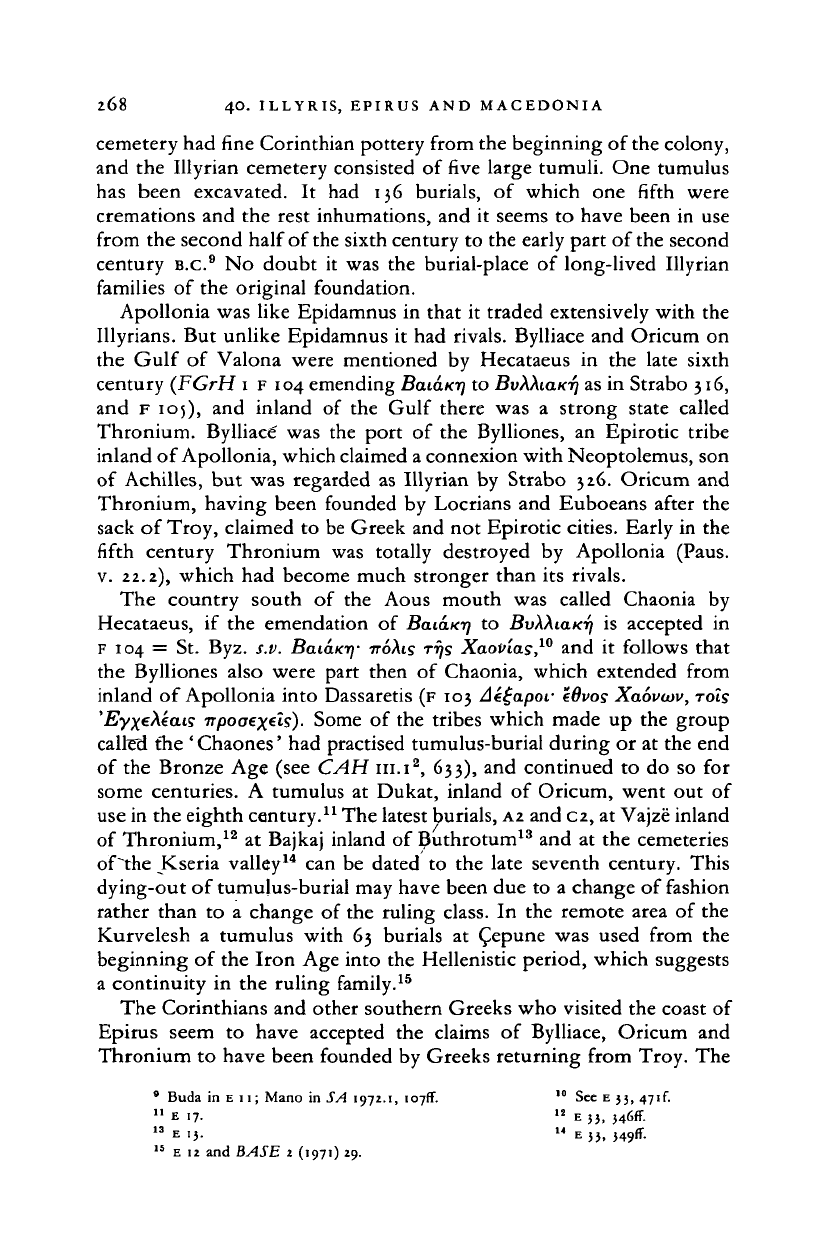
268 4°- ILLYRIS, EPIRUS AND MACEDONIA
cemetery had fine Corinthian pottery from the beginning of
the
colony,
and the Illyrian cemetery consisted of five large tumuli. One tumulus
has been excavated.
It
had 136 burials,
of
which one fifth were
cremations and the rest inhumations, and it seems to have been in use
from the second half of
the
sixth century to the early part of
the
second
century B.C.
9
No doubt
it
was the burial-place of long-lived Illyrian
families of the original foundation.
Apollonia was like Epidamnus in that it traded extensively with the
Illyrians. But unlike Epidamnus it had rivals. Bylliace and Oricum on
the Gulf of Valona were mentioned by Hecataeus
in
the late sixth
century (FGrH
1
F 104 emending
BataKr)
to BvAAia/07 as in Strabo 316,
and F 105), and inland of the Gulf there was
a
strong state called
Thronium. Bylliac6 was the port of the Bylliones, an Epirotic tribe
inland of Apollonia, which claimed a connexion with Neoptolemus, son
of Achilles, but was regarded as Illyrian by Strabo 326. Oricum and
Thronium, having been founded by Locrians and Euboeans after the
sack of Troy, claimed to be Greek and not Epirotic cities. Early in the
fifth century Thronium was totally destroyed by Apollonia (Paus.
v. 22.2), which had become much stronger than its rivals.
The country south
of
the Aous mouth was called Chaonia
by
Hecataeus,
if
the emendation of
Ba.ia.K7j
to
BvXXiaKr)
is accepted in
F 104
=
St. Byz. s.v. BaiaKfj-
ITOXIS
rr/s Xaovlas,
10
and
it
follows that
the Bylliones also were part then of Chaonia, which extended from
inland of Apollonia into Dassaretis
(F 103 degapor Wvos
Xaovcov,
TOIS
'EyxeXeais irpoaex^ls)- Some of the tribes which made up the group
called the ' Chaones' had practised tumulus-burial during or at the end
of the Bronze Age (see CAH m.i
2
, 633), and continued to do so for
some centuries. A tumulus at Dukat, inland of Oricum, went out of
use in the eighth century.
11
The latest burials,
A2
and
C2,
at Vajze inland
of Thronium,
12
at Bajkaj inland of Buthrotum
13
and at the cemeteries
of "the Kseria valley
14
can be dated to the late seventh century. This
dying-out of tumulus-burial may have been due to a change of fashion
rather than to a change of the ruling class. In the remote area of the
Kurvelesh
a
tumulus with 63 burials
at
Cepune was used from the
beginning of the Iron Age into the Hellenistic period, which suggests
a continuity in the ruling family.
15
The Corinthians and other southern Greeks who visited the coast of
Epirus seem
to
have accepted the claims
of
Bylliace, Oricum and
Thronium to have been founded by Greeks returning from Troy. The
• Buda in E 11; Mano in
5A
1972.1,
loyff.
l0
See E 33,
47if.
11
E
17.
12
E 3},
J46ff.
13
E
"3-
14
E 33,
34
9
ff.
ls
E 12 and BASE 2 (1971) 29.
Cambridge Histories Online © Cambridge University Press, 2008
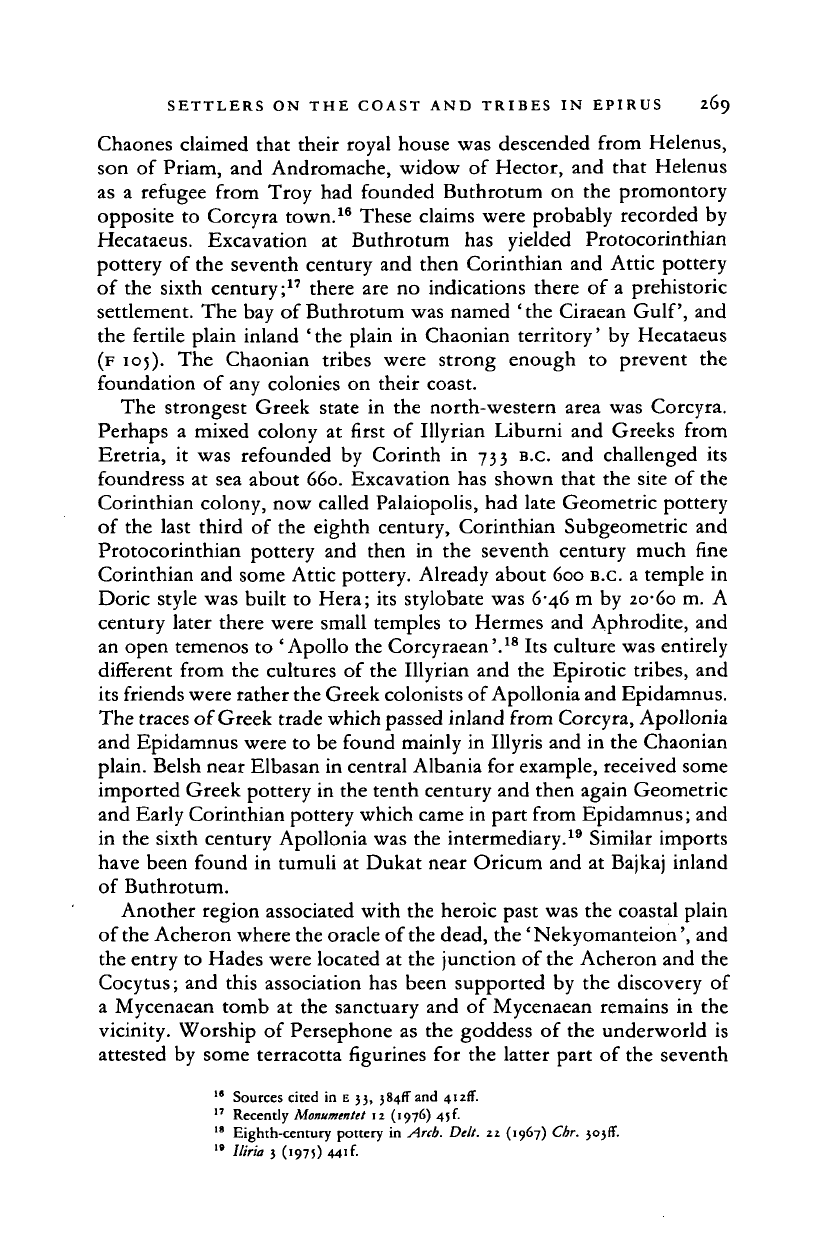
SETTLERS ON THE COAST AND TRIBES IN EPIRUS 269
Chaones claimed that their royal house was descended from Helenus,
son of Priam, and Andromache, widow of Hector, and that Helenus
as
a
refugee from Troy had founded Buthrotum on the promontory
opposite to Corcyra town.
16
These claims were probably recorded by
Hecataeus. Excavation
at
Buthrotum
has
yielded Protocorinthian
pottery of the seventh century and then Corinthian and Attic pottery
of the sixth century;
17
there are no indications there of a prehistoric
settlement. The bay of Buthrotum was named ' the Ciraean
Gulf,
and
the fertile plain inland 'the plain in Chaonian territory' by Hecataeus
(F
105). The Chaonian tribes were strong enough
to
prevent
the
foundation of any colonies on their coast.
The strongest Greek state
in
the north-western area was Corcyra.
Perhaps
a
mixed colony
at
first of Illyrian Liburni and Greeks from
Eretria,
it
was refounded by Corinth
in
733
B.C.
and challenged
its
foundress at sea about 660. Excavation has shown that the site of the
Corinthian colony, now called Palaiopolis, had late Geometric pottery
of the last third of the eighth century, Corinthian Subgeometric and
Protocorinthian pottery and then
in
the seventh century much fine
Corinthian and some Attic pottery. Already about 600
B.C.
a temple in
Doric style was built to Hera; its stylobate was 6-46 m by 20*60 m. A
century later there were small temples to Hermes and Aphrodite, and
an open temenos to 'Apollo the Corcyraean'.
18
Its culture was entirely
different from the cultures of the Illyrian and the Epirotic tribes, and
its friends were rather the Greek colonists of Apollonia and Epidamnus.
The traces of Greek trade which passed inland from Corcyra, Apollonia
and Epidamnus were to be found mainly in Ulyris and in the Chaonian
plain. Belsh near Elbasan in central Albania for example, received some
imported Greek pottery in the tenth century and then again Geometric
and Early Corinthian pottery which came in part from Epidamnus; and
in the sixth century Apollonia was the intermediary.
19
Similar imports
have been found in tumuli at Dukat near Oricum and at Bajkaj inland
of Buthrotum.
Another region associated with the heroic past was the coastal plain
of
the
Acheron where the oracle of
the
dead, the 'Nekyomanteion', and
the entry to Hades were located at the junction of the Acheron and the
Cocytus; and this association has been supported by the discovery of
a Mycenaean tomb at the sanctuary and of Mycenaean remains in the
vicinity. Worship of Persephone as the goddess of the underworld
is
attested by some terracotta figurines for the latter part of the seventh
" Sources cited in E 33, 384ffand
4i2ff.
" Recently Monumtnttt 12 (1976) 4jf.
18
Eighth-century pottery in Arch. Delt. 22 (1967) Chr. io>,S.
" lliria
3
(197)) 44'f-
Cambridge Histories Online © Cambridge University Press, 2008
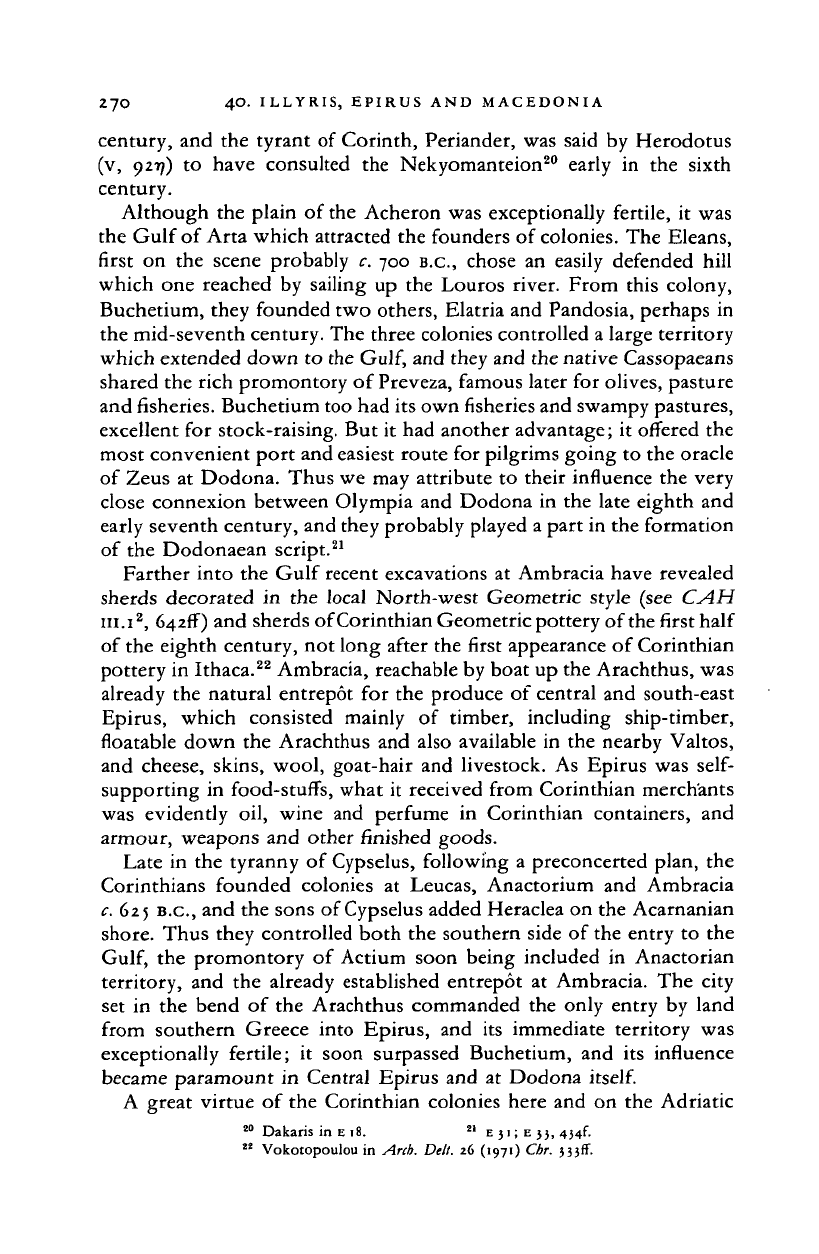
27O 4°- ILLYRIS, EPIRUS AND MACEDONIA
century,
and the
tyrant
of
Corinth, Periander,
was
said
by
Herodotus
(v,
927;)
to
have consulted
the
Nekyomanteion
20
early
in the
sixth
century.
Although
the
plain
of
the Acheron
was
exceptionally fertile,
it
was
the Gulf
of
Arta which attracted
the
founders
of
colonies.
The
Eleans,
first on
the
scene probably
c. 700 B.C.,
chose
an
easily defended hill
which
one
reached
by
sailing
up the
Louros river. From this colony,
Buchetium, they founded
two
others, Elatria
and
Pandosia, perhaps
in
the mid-seventh century.
The
three colonies controlled
a
large territory
which extended down
to the Gulf, and
they
and the
native Cassopaeans
shared
the
rich promontory
of
Preveza, famous later
for
olives, pasture
and fisheries. Buchetium
too had its own
fisheries
and
swampy pastures,
excellent
for
stock-raising.
But
it
had
another advantage;
it
offered
the
most convenient port
and
easiest route
for
pilgrims going
to the
oracle
of Zeus
at
Dodona. Thus
we may
attribute
to
their influence
the
very
close connexion between Olympia
and
Dodona
in
the
late eighth
and
early seventh century,
and
they probably played
a
part
in the
formation
of
the
Dodonaean script.
21
Farther into
the
Gulf recent excavations
at
Ambracia have revealed
sherds decorated
in the
local North-west Geometric style
(see
CAH
m.
1
2
,
642ft")
and
sherds of Corinthian Geometric pottery of the first half
of
the
eighth century,
not
long after
the
first appearance
of
Corinthian
pottery
in
Ithaca.
22
Ambracia, reachable
by
boat
up the
Arachthus,
was
already
the
natural entrepot
for
the
produce
of
central
and
south-east
Epirus, which consisted mainly
of
timber, including ship-timber,
floatable down
the
Arachthus
and
also available
in
the
nearby Valtos,
and cheese, skins, wool, goat-hair
and
livestock.
As
Epirus
was self-
supporting
in
food-stuffs, what
it
received from Corinthian merchants
was evidently
oil,
wine
and
perfume
in
Corinthian containers,
and
armour, weapons
and
other finished goods.
Late
in
the
tyranny
of
Cypselus, following
a
preconcerted plan,
the
Corinthians founded colonies
at
Leucas, Anactorium
and
Ambracia
c.
625
B.C.,
and the
sons
of
Cypselus added Heraclea
on the
Acarnanian
shore. Thus they controlled both
the
southern side
of
the
entry
to
the
Gulf,
the
promontory
of
Actium soon being included
in
Anactorian
territory,
and the
already established entrepot
at
Ambracia.
The
city
set
in the
bend
of
the
Arachthus commanded
the
only entry
by
land
from southern Greece into Epirus,
and its
immediate territory
was
exceptionally fertile;
it
soon surpassed Buchetium,
and its
influence
became paramount
in
Central Epirus
and
at
Dodona
itself.
A great virtue
of
the
Corinthian colonies here
and
on
the
Adriatic
20
Dakaris
in
E 18.
21
E
31; E 33,
434f.
•* Vokotopoulou
in
Arib.
Del/. 26
(1971) Cbr.
333ff.
Cambridge Histories Online © Cambridge University Press, 2008
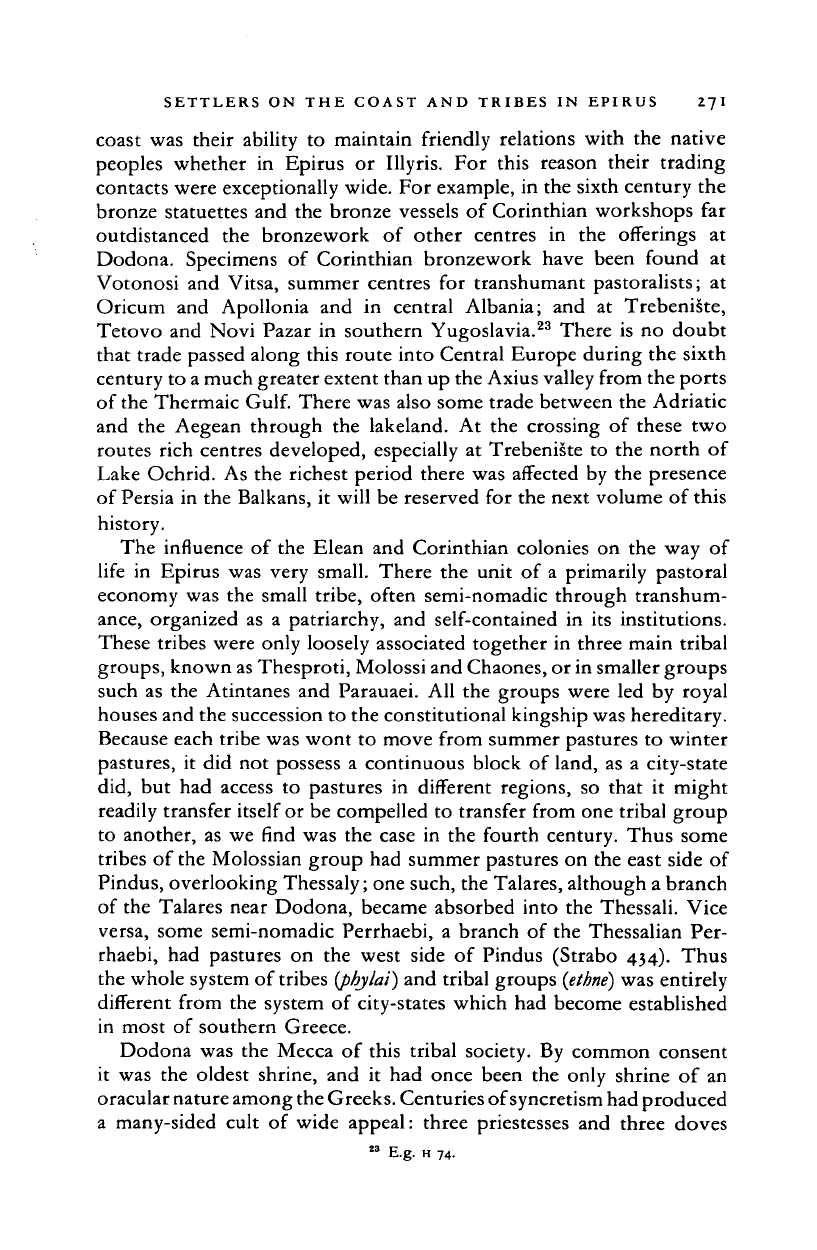
SETTLERS ON THE COAST AND TRIBES IN EPIRUS 27I
coast was their ability
to
maintain friendly relations with the native
peoples whether
in
Epirus
or
Illyris. For this reason their trading
contacts were exceptionally wide. For example, in the sixth century the
bronze statuettes and the bronze vessels of Corinthian workshops far
outdistanced
the
bronzework
of
other centres
in the
offerings
at
Dodona. Specimens
of
Corinthian bronzework have been found
at
Votonosi and Vitsa, summer centres for transhumant pastoralists;
at
Oricum and Apollonia and
in
central Albania; and
at
Trebeniste,
Tetovo and Novi Pazar in southern Yugoslavia.
23
There is no doubt
that trade passed along this route into Central Europe during the sixth
century to a much greater extent than up the Axius valley from the ports
of the Thermaic
Gulf.
There was also some trade between the Adriatic
and the Aegean through the lakeland. At the crossing
of
these two
routes rich centres developed, especially at Trebeniste to the north of
Lake Ochrid. As the richest period there was affected by the presence
of Persia in the Balkans,
it
will be reserved for the next volume of this
history.
The influence of the Elean and Corinthian colonies on the way of
life
in
Epirus was very small. There the unit of a primarily pastoral
economy was the small tribe, often semi-nomadic through transhum-
ance,
organized as
a
patriarchy, and self-contained in its institutions.
These tribes were only loosely associated together in three main tribal
groups, known as Thesproti, Molossi and Chaones, or in smaller groups
such as the Atintanes and Parauaei. All the groups were led by royal
houses and the succession to the constitutional kingship was hereditary.
Because each tribe was wont to move from summer pastures to winter
pastures,
it
did not possess
a
continuous block of land, as a city-state
did, but had access to pastures
in
different regions, so that
it
might
readily transfer itself or be compelled to transfer from one tribal group
to another, as we find was the case in the fourth century. Thus some
tribes of the Molossian group had summer pastures on the east side of
Pindus, overlooking Thessaly; one such, the Talares, although a branch
of the Talares near Dodona, became absorbed into the Thessali. Vice
versa, some semi-nomadic Perrhaebi,
a
branch of the Thessalian Per-
rhaebi, had pastures on the west side
of
Pindus (Strabo 434). Thus
the whole system of tribes
(phylai)
and tribal groups
(ethne)
was entirely
different from the system of city-states which had become established
in most of southern Greece.
Dodona was the Mecca of this tribal society. By common consent
it was the oldest shrine, and
it
had once been the only shrine
of
an
oracular nature among the
Greeks.
Centuries of syncretism had produced
a many-sided cult
of
wide appeal: three priestesses and three doves
" E.g. H 74.
Cambridge Histories Online © Cambridge University Press, 2008
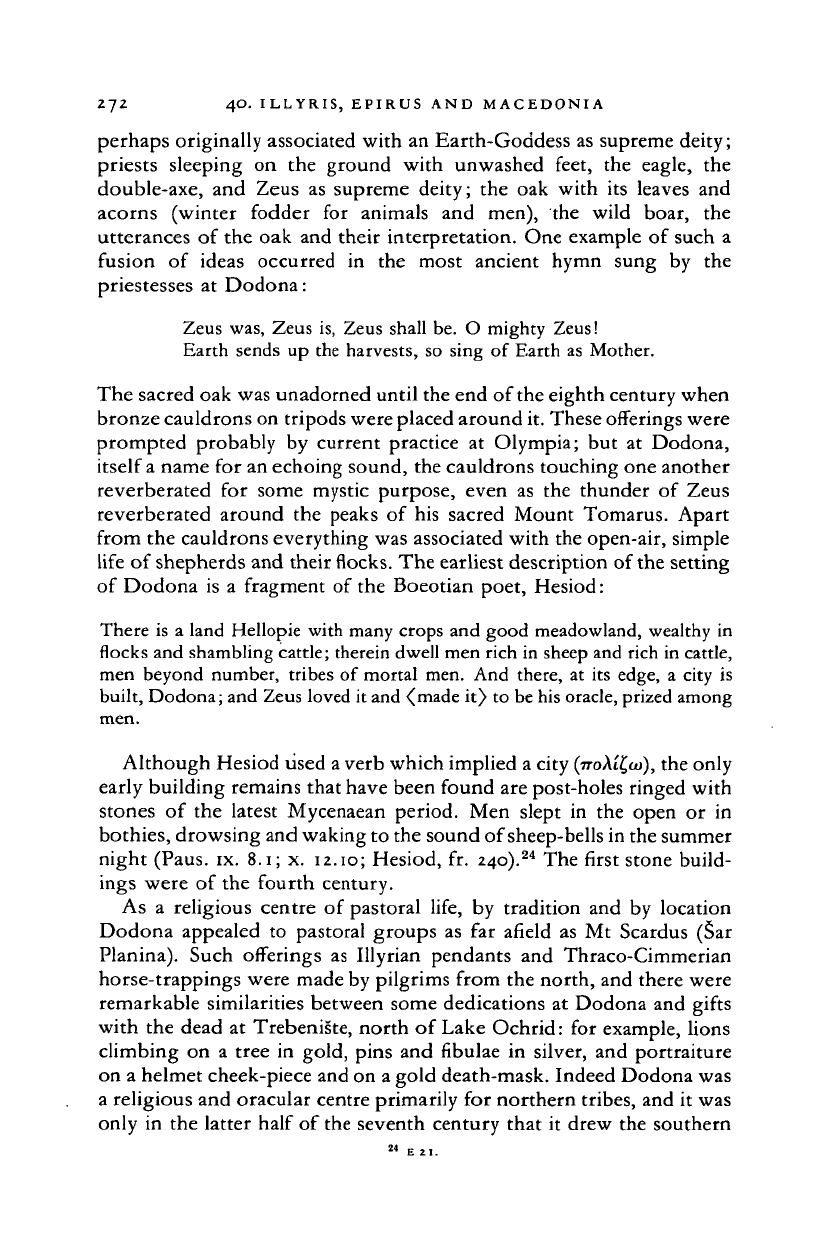
272 4°- ILLYRIS, EPIRUS AND MACEDONIA
perhaps originally associated with
an
Earth-Goddess
as
supreme deity;
priests sleeping
on the
ground with unwashed feet,
the
eagle,
the
double-axe,
and
Zeus
as
supreme deity;
the oak
with
its
leaves
and
acorns (winter fodder
for
animals
and
men),
the
wild boar,
the
utterances
of
the oak and
their interpretation.
One
example
of
such
a
fusion
of
ideas occurred
in the
most ancient hymn sung
by the
priestesses
at
Dodona:
Zeus
was,
Zeus
is,
Zeus shall be.
O
mighty Zeus!
Earth sends
up the
harvests,
so
sing
of
Earth
as
Mother.
The sacred
oak was
unadorned until
the end of
the
eighth century when
bronze cauldrons
on
tripods were placed around it. These offerings were
prompted probably
by
current practice
at
Olympia;
but at
Dodona,
itself
a
name
for an
echoing sound,
the
cauldrons touching
one
another
reverberated
for
some mystic purpose, even
as the
thunder
of
Zeus
reverberated around
the
peaks
of
his
sacred Mount Tomarus. Apart
from
the
cauldrons everything
was
associated with
the
open-air, simple
life
of
shepherds
and
their flocks.
The
earliest description
of
the
setting
of Dodona
is a
fragment
of the
Boeotian poet, Hesiod:
There
is a
land Hellopie with many crops
and
good meadowland, wealthy
in
flocks and shambling cattle; therein dwell men rich
in
sheep and rich
in
cattle,
men beyond number, tribes
of
mortal
men. And
there,
at
its
edge,
a
city
is
built, Dodona;
and
Zeus loved
it
and <made
it) to
be his oracle, prized among
men.
Although Hesiod used
a
verb which implied a city
(TTOAI£OO),
the only
early building remains that have been found
are
post-holes ringed with
stones
of
the
latest Mycenaean period.
Men
slept
in the
open
or in
bothies, drowsing and waking
to the
sound of sheep-bells
in
the summer
night (Paus.
ix. 8.1;
x.
12.10; Hesiod,
fr.
240).
24
The
first stone build-
ings were
of
the
fourth century.
As
a
religious centre
of
pastoral life,
by
tradition
and
by
location
Dodona appealed
to
pastoral groups
as far
afield
as Mt
Scardus
(Sar
Planina). Such offerings
as
Illyrian pendants
and
Thraco-Cimmerian
horse-trappings were made
by
pilgrims from
the
north,
and
there were
remarkable similarities between some dedications
at
Dodona
and
gifts
with
the
dead
at
Trebeniste, north
of
Lake Ochrid:
for
example, lions
climbing
on a
tree
in
gold, pins
and
fibulae
in
silver,
and
portraiture
on
a
helmet cheek-piece
and on a
gold death-mask. Indeed Dodona
was
a religious
and
oracular centre primarily
for
northern tribes,
and
it
was
only
in
the
latter half
of
the seventh century that
it
drew
the
southern
Cambridge Histories Online © Cambridge University Press, 2008
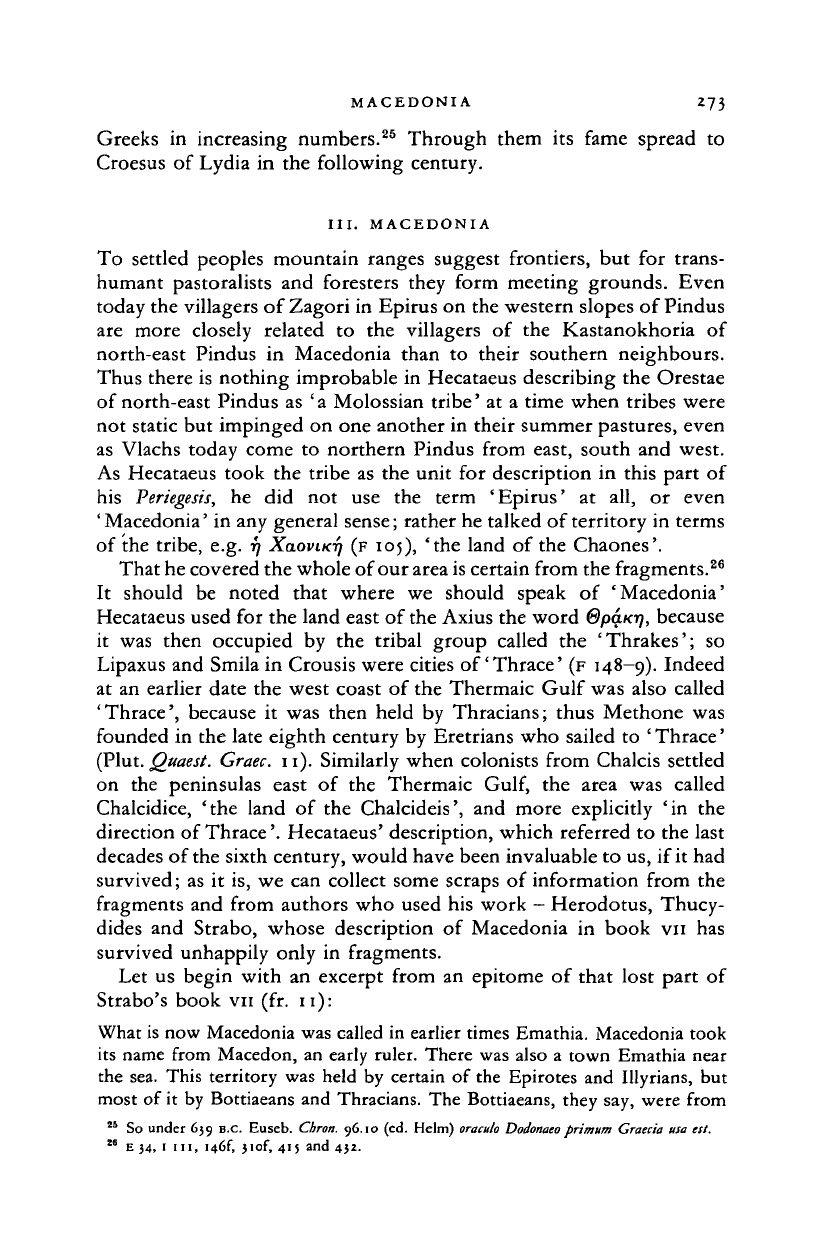
MACEDONIA 273
Greeks in increasing numbers.
25
Through them its fame spread to
Croesus of Lydia in the following century.
III.
MACEDONIA
To settled peoples mountain ranges suggest frontiers, but for trans-
humant pastoralists and foresters they form meeting grounds. Even
today the villagers of Zagori in Epirus on the western slopes of Pindus
are more closely related to the villagers of the Kastanokhoria of
north-east Pindus in Macedonia than to their southern neighbours.
Thus there is nothing improbable in Hecataeus describing the Orestae
of north-east Pindus as '
a
Molossian tribe' at a time when tribes were
not static but impinged on one another in their summer pastures, even
as Vlachs today come to northern Pindus from east, south and west.
As Hecataeus took the tribe as the unit for description in this part of
his
Periegesis,
he did not use the term 'Epirus' at all, or even
' Macedonia' in any general sense; rather he talked of territory in terms
of the tribe, e.g.
r] XaoviK-f)
(F 105), 'the land of the Chaones'.
That he covered the whole of our area is certain from the fragments.
26
It should be noted that where we should speak of 'Macedonia'
Hecataeus used for the land east of the Axius the word
QpaKt),
because
it was then occupied by the tribal group called the 'Thrakes'; so
Lipaxus and Smila in Crousis were cities of'Thrace'
(F
148—9). Indeed
at an earlier date the west coast of the Thermaic Gulf was also called
'Thrace', because it was then held by Thracians; thus Methone was
founded in the late eighth century by Eretrians who sailed to ' Thrace'
(Plut.
Quaest.
Graec.
11). Similarly when colonists from Chalcis settled
on the peninsulas east of the Thermaic
Gulf,
the area was called
Chalcidice, 'the land of the Chalcideis', and more explicitly 'in the
direction of Thrace'. Hecataeus' description, which referred to the last
decades of the sixth century, would have been invaluable to us, if it had
survived; as it is, we can collect some scraps of information from the
fragments and from authors who used his work
—
Herodotus, Thucy-
dides and Strabo, whose description of Macedonia in book vn has
survived unhappily only in fragments.
Let us begin with an excerpt from an epitome of that lost part of
Strabo's book vn (fr. 11):
What is now Macedonia was called in earlier times Emathia. Macedonia took
its name from Macedon, an early ruler. There was also a town Emathia near
the sea. This territory was held by certain of the Epirotes and Illyrians, but
most of it by Bottiaeans and Thracians. The Bottiaeans, they say, were from
24
So under 639 B.C. Euseb. Chron. 96.10 (ed. Helm)
oraculo Dodonaeo
primum Graecia usa est.
n
E 34, 1 in,
i46f,
}iof, 415 and 432.
Cambridge Histories Online © Cambridge University Press, 2008
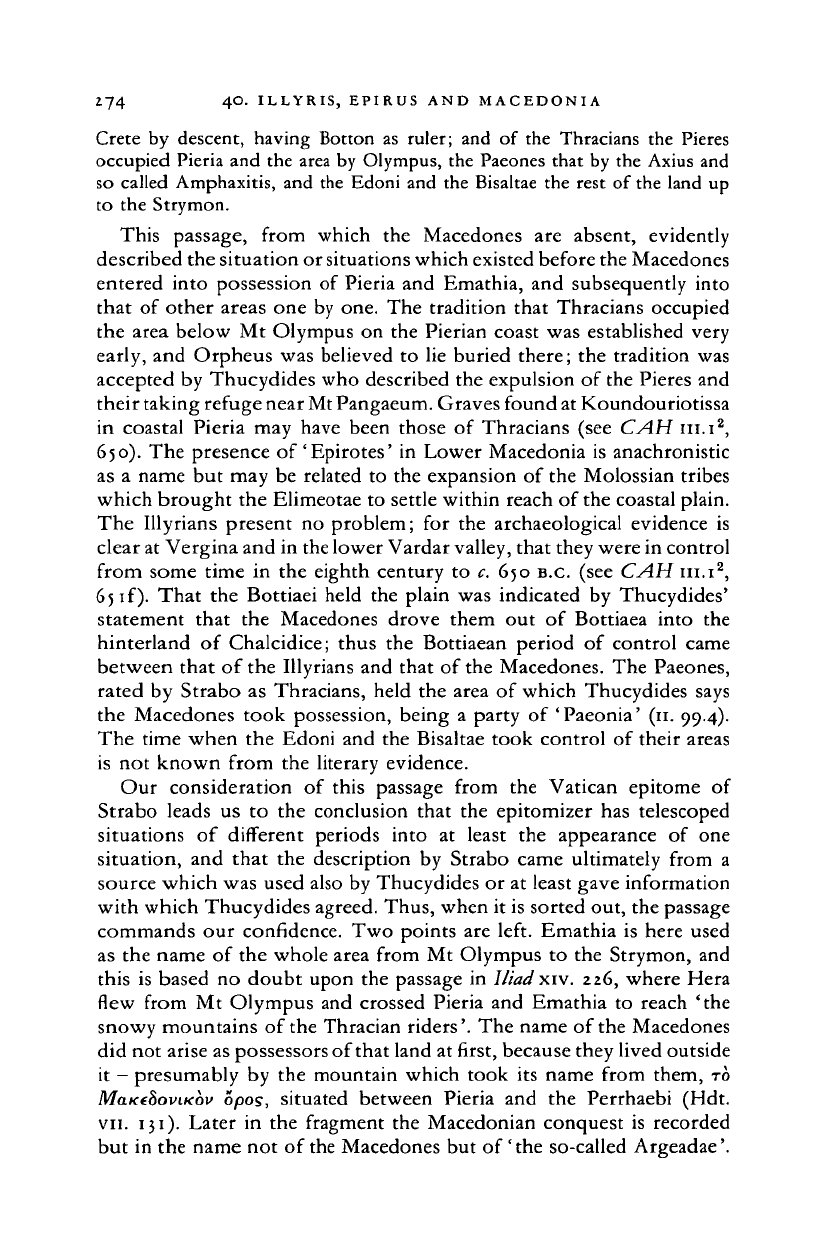
274 4°- ILLYRIS, EPIRUS AND MACEDONIA
Crete by descent, having Botton as ruler; and
of
the Thracians the Pieres
occupied Pieria and the area by Olympus, the Paeones that by the Axius and
so called Amphaxitis, and the Edoni and the Bisaltae the rest of the land up
to the Strymon.
This passage, from which
the
Macedones
are
absent, evidently
described the situation or situations which existed before the Macedones
entered into possession
of
Pieria and Emathia, and subsequently into
that
of
other areas one by one. The tradition that Thracians occupied
the area below Mt Olympus on the Pierian coast was established very
early, and Orpheus was believed
to
lie buried there; the tradition was
accepted by Thucydides who described the expulsion of the Pieres and
their taking refuge near
Mt
Pangaeum. Graves found at Koundouriotissa
in coastal Pieria may have been those
of
Thracians (see
CAH
m.i
2
,
650).
The presence
of
'Epirotes' in Lower Macedonia is anachronistic
as
a
name but may be related to the expansion of the Molossian tribes
which brought the Elimeotae to settle within reach of the coastal plain.
The Illyrians present no problem;
for
the archaeological evidence
is
clear at Vergina and in the lower Vardar valley, that they were in control
from some time
in
the eighth century
to
c. 650 B.C. (see
CAH
m.i
2
,
65
if). That the Bottiaei held the plain was indicated by Thucydides'
statement that
the
Macedones drove them
out of
Bottiaea into
the
hinterland
of
Chalcidice; thus the Bottiaean period
of
control came
between that of the Illyrians and that of the Macedones. The Paeones,
rated by Strabo as Thracians, held the area
of
which Thucydides says
the Macedones took possession, being
a
party
of
'Paeonia'
(11.
99.4).
The time when the Edoni and the Bisaltae took control of their areas
is not known from the literary evidence.
Our consideration
of
this passage from
the
Vatican epitome
of
Strabo leads
us to
the conclusion that the epitomizer has telescoped
situations
of
different periods into
at
least
the
appearance
of one
situation, and that the description
by
Strabo came ultimately from
a
source which was used also by Thucydides or at least gave information
with which Thucydides agreed. Thus, when it is sorted out, the passage
commands our confidence. Two points are left. Emathia is here used
as the name
of
the whole area from Mt Olympus
to
the Strymon, and
this is based no doubt upon the passage in Iliad xiv. 226, where Hera
flew from Mt Olympus and crossed Pieria and Emathia
to
reach 'the
snowy mountains of the Thracian riders'. The name of the Macedones
did not arise as possessors of that land at first, because they lived outside
it
-
presumably
by
the mountain which took
its
name from them,
TO
MaKehoviKov
opos, situated between Pieria
and the
Perrhaebi (Hdt.
VII.
131). Later
in
the fragment the Macedonian conquest
is
recorded
but in the name not of the Macedones but of'the so-called Argeadae'.
Cambridge Histories Online © Cambridge University Press, 2008
